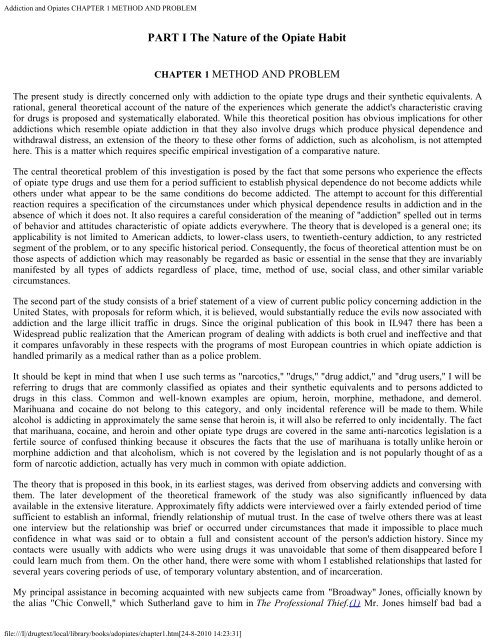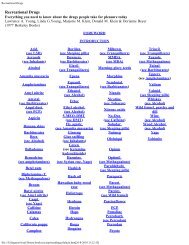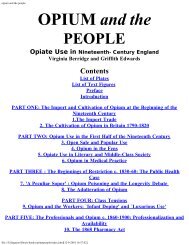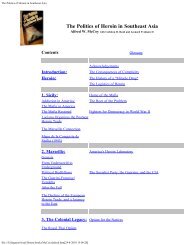Addiction and Opiates
Addiction and Opiates
Addiction and Opiates
You also want an ePaper? Increase the reach of your titles
YUMPU automatically turns print PDFs into web optimized ePapers that Google loves.
<strong>Addiction</strong> <strong>and</strong> <strong>Opiates</strong> CHAPTER 1 METHOD AND PROBLEM<br />
file:///I|/drugtext/local/library/books/adopiates/chapter1.htm[24-8-2010 14:23:31]<br />
PART I The Nature of the Opiate Habit<br />
CHAPTER 1 METHOD AND PROBLEM<br />
The present study is directly concerned only with addiction to the opiate type drugs <strong>and</strong> their synthetic equivalents. A<br />
rational, general theoretical account of the nature of the experiences which generate the addict's characteristic craving<br />
for drugs is proposed <strong>and</strong> systematically elaborated. While this theoretical position has obvious implications for other<br />
addictions which resemble opiate addiction in that they also involve drugs which produce physical dependence <strong>and</strong><br />
withdrawal distress, an extension of the theory to these other forms of addiction, such as alcoholism, is not attempted<br />
here. This is a matter which requires specific empirical investigation of a comparative nature.<br />
The central theoretical problem of this investigation is posed by the fact that some persons who experience the effects<br />
of opiate type drugs <strong>and</strong> use them for a period sufficient to establish physical dependence do not become addicts while<br />
others under what appear to be the same conditions do become addicted. The attempt to account for this differential<br />
reaction requires a specification of the circumstances under which physical dependence results in addiction <strong>and</strong> in the<br />
absence of which it does not. It also requires a careful consideration of the meaning of "addiction" spelled out in terms<br />
of behavior <strong>and</strong> attitudes characteristic of opiate addicts everywhere. The theory that is developed is a general one; its<br />
applicability is not limited to American addicts, to lower-class users, to twentieth-century addiction, to any restricted<br />
segment of the problem, or to any specific historical period. Consequently, the focus of theoretical attention must be on<br />
those aspects of addiction which may reasonably be regarded as basic or essential in the sense that they are invariably<br />
manifested by all types of addicts regardless of place, time, method of use, social class, <strong>and</strong> other similar variable<br />
circumstances.<br />
The second part of the study consists of a brief statement of a view of current public policy concerning addiction in the<br />
United States, with proposals for reform which, it is believed, would substantially reduce the evils now associated with<br />
addiction <strong>and</strong> the large illicit traffic in drugs. Since the original publication of this book in IL947 there has been a<br />
Widespread public realization that the American program of dealing with addicts is both cruel <strong>and</strong> ineffective <strong>and</strong> that<br />
it compares unfavorably in these respects with the programs of most European countries in which opiate addiction is<br />
h<strong>and</strong>led primarily as a medical rather than as a police problem.<br />
It should be kept in mind that when I use such terms as "narcotics," "drugs," "drug addict," <strong>and</strong> "drug users," I will be<br />
referring to drugs that are commonly classified as opiates <strong>and</strong> their synthetic equivalents <strong>and</strong> to persons addicted to<br />
drugs in this class. Common <strong>and</strong> well-known examples are opium, heroin, morphine, methadone, <strong>and</strong> demerol.<br />
Marihuana <strong>and</strong> cocaine do not belong to this category, <strong>and</strong> only incidental reference will be made to them. While<br />
alcohol is addicting in approximately the same sense that heroin is, it will also be referred to only incidentally. The fact<br />
that marihuana, cocaine, <strong>and</strong> heroin <strong>and</strong> other opiate type drugs are covered in the same anti-narcotics legislation is a<br />
fertile source of confused thinking because it obscures the facts that the use of marihuana is totally unlike heroin or<br />
morphine addiction <strong>and</strong> that alcoholism, which is not covered by the legislation <strong>and</strong> is not popularly thought of as a<br />
form of narcotic addiction, actually has very much in common with opiate addiction.<br />
The theory that is proposed in this book, in its earliest stages, was derived from observing addicts <strong>and</strong> conversing with<br />
them. The later development of the theoretical framework of the study was also significantly influenced by data<br />
available in the extensive literature. Approximately fifty addicts were interviewed over a fairly extended period of time<br />
sufficient to establish an informal, friendly relationship of mutual trust. In the case of twelve others there was at least<br />
one interview but the relationship was brief or occurred under circumstances that made it impossible to place much<br />
confidence in what was said or to obtain a full <strong>and</strong> consistent account of the person's addiction history. Since my<br />
contacts were usually with addicts who were using drugs it was unavoidable that some of them disappeared before I<br />
could learn much from them. On the other h<strong>and</strong>, there were some with whom I established relationships that lasted for<br />
several years covering periods of use, of temporary voluntary abstention, <strong>and</strong> of incarceration.<br />
My principal assistance in becoming acquainted with new subjects came from "Broadway" Jones, officially known by<br />
the alias "Chic Conwell," which Sutherl<strong>and</strong> gave to him in The Professional Thief.(1) Mr. Jones himself bad bad a





